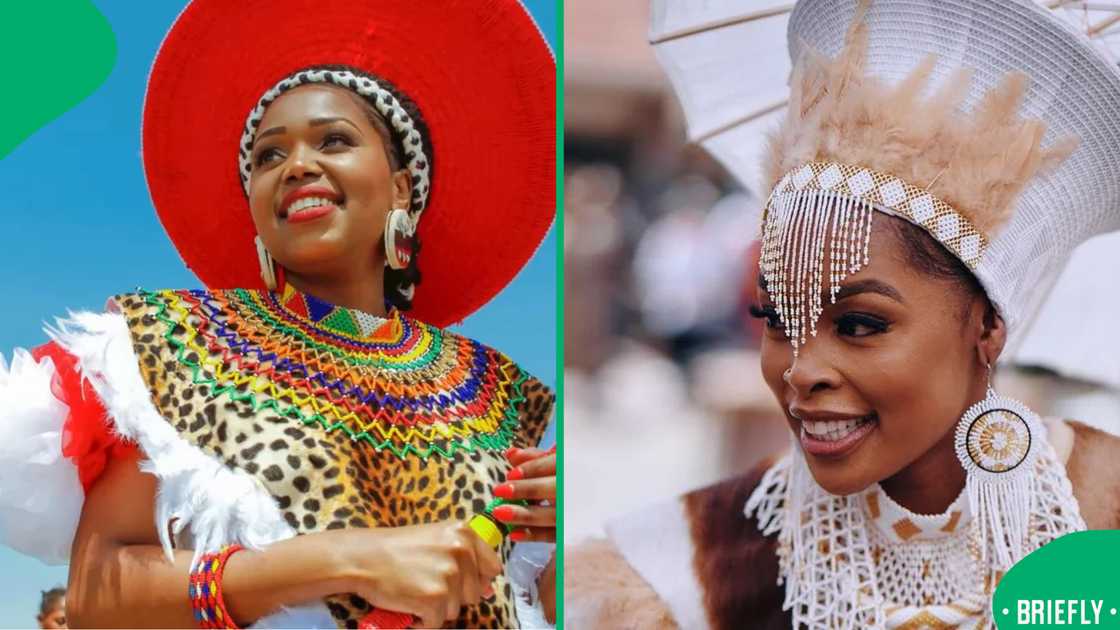The History and Significance of Zulu Women’s Headdresses Leave Mzansi Impressed
- A Reddit discussion explored the cultural significance of African women's headdresses, specifically Zulu
- The conversation highlighted that headdresses are profound cultural emblems signifying identity, status, and spirituality
- Today, the isicholo is a vibrant symbol of Zulu heritage and femininity, worn during ceremonies and evolving in design
PAY ATTENTION: You can now search for all your favourite news and topics on Briefly News.
South Africans engaged in a thought-provoking Reddit discussion about the rich cultural significance of African women's headdresses, particularly the Zulu isicholo, recognising them as profound symbols of identity, status, and evolving heritage.

Source: Twitter
A thought-provoking discussion recently emerged on Reddit, sparked by user Disastrous_Macaron34, who opened up a meaningful thread about the cultural significance of African women’s headdresses, with a particular focus on Zulu traditions. The post quickly gained attention across the platform, drawing in users who were eager to share knowledge, ask questions, and celebrate the rich symbolism behind these traditional adornments.
The conversation highlighted that headdresses are profound cultural emblems, signifying identity, status, and spirituality. Among the many examples shared, the Zulu isicholo stood out as a striking symbol of both heritage and femininity. This headdress, still worn by Zulu women today during ceremonies and cultural events, has a long and fascinating history that reflects the evolution of social customs, aesthetics, and craftsmanship in Zulu society.

Read also
A Haval Ladies Club made a stylish entrance in a synchronised SUV convoy, showcased in a TikTok video
In African cultures, headdresses carry deep meaning and rich symbolism. These striking adornments are more than just fashion statements; they are woven into the identity, status, and spirituality of various ethnic groups across the continent. From indicating a person’s leadership role or marital status to expressing spiritual beliefs or artistic flair, the significance of headdresses spans generations. Among the Zulu people of South Africa, one of the most iconic traditional headdresses is the isicholo.
PAY ATTENTION: Briefly News is now on YouTube! Check out our interviews on Briefly TV Life now!
The isicholo has its roots in the early 19th century, when married Zulu women would shave their heads and create a cone-shaped topknot, dyed red with a mixture of ochre and fat. This practice symbolised the transition from maidenhood to married life, and was an expression of respect for the husband and his family. Over time, this hairstyle evolved into a more structured and ornate headdress.
Zulu headdress blends heritage, identity, and timeless style
Traditionally crafted from palm fibre and grass, and even incorporating human hair, the isicholo was woven using basketry techniques. The final piece was covered with yarn or string to create a dense surface, then dyed with red ochre. Though red remains the traditional colour, modern versions of the isicholo now feature a variety of shades and sizes, and often include beadwork, cowrie shells, feathers, and other decorative embellishments. These additions reflect both cultural aesthetics and contemporary creativity, making each headdress a unique piece of wearable art.

Read also
A touching TikTok video captured beautiful, emotional lobola ceremony as family formally requested marriage
The isicholo is more than just a symbol of marital status; it is closely tied to ideas of beauty, femininity, and identity within Zulu culture. Its structure is both functional and expressive, showcasing the traditional craftsmanship of Zulu women. The use of a basket frame provides durability, while the fabric covering and inner lining add comfort and elegance.
Today, the isicholo is still proudly worn during traditional ceremonies, weddings, and cultural celebrations. Its continued presence is a testament to the resilience and pride of Zulu women, who embrace their heritage and share it with the world through their attire. While styles may evolve and materials modernise, the spirit and meaning behind the isicholo remains rooted in history, tradition, and honour.

Source: Twitter
Mzansi reacted to the Reddit post
Godwillmoabyte wrote:
"African women are so beautiful, to be honest."
Marziri replied:
"African men are handsome too, to be honest."
Blackdeacon25 commented:
"Love this! Unity in motion!"
RosemaryHoyt wrote:
"They’re beautiful and truly make their wearers look regal."
Capable-Dragonfly-96 shared:
"Here in Italy, 'Zulu' is sometimes used as an insult, like when someone’s being rude. It’s such a shame, because the Zulu culture is beautiful. Sending love from Italy."
Disastrous_Macaron34 responded:
"That’s really sad to hear, the ignorance is unfortunate. Thank you so much. 💜"

Read also
"That's how it's supposed to be": Young Afrikaans-speaking sibling's fluent Zulu banter charms SA
Turbulent_Tea_7811 commented:
"Absolutely majestic. That wedding dress in the last pic is a dream!"
Disastrous_Macaron34 replied:
"Yes! She looks like royalty. 👑"
IanRevived94J wrote:
"This is top-tier beauty, no doubt."
Misionestierraplana commented:
"Beautiful women. Greetings from Argentina!"
Weary-Wasabi1721 added:
"South African women are fine as hell. Go there, every direction you look, there’s a 10."
Check out the Reddit post below

Source: AFP
3 Briefly News stories about Zulu culture
- A charming video featuring two Afrikaans-speaking siblings engaging in a cute argument entirely in isiZulu sparked widespread joy.
- A powerful display of cultural pride at a local grocery store by Zulu men resonated with users across social media.
- A TikTok user shared a video showing people dressed in traditional Zulu attire entering a Spur restaurant at Fourways Mall, which impressed many.
PAY ATTENTION: Follow Briefly News on Twitter and never miss the hottest topics! Find us at @brieflyza!
Source: Briefly News

